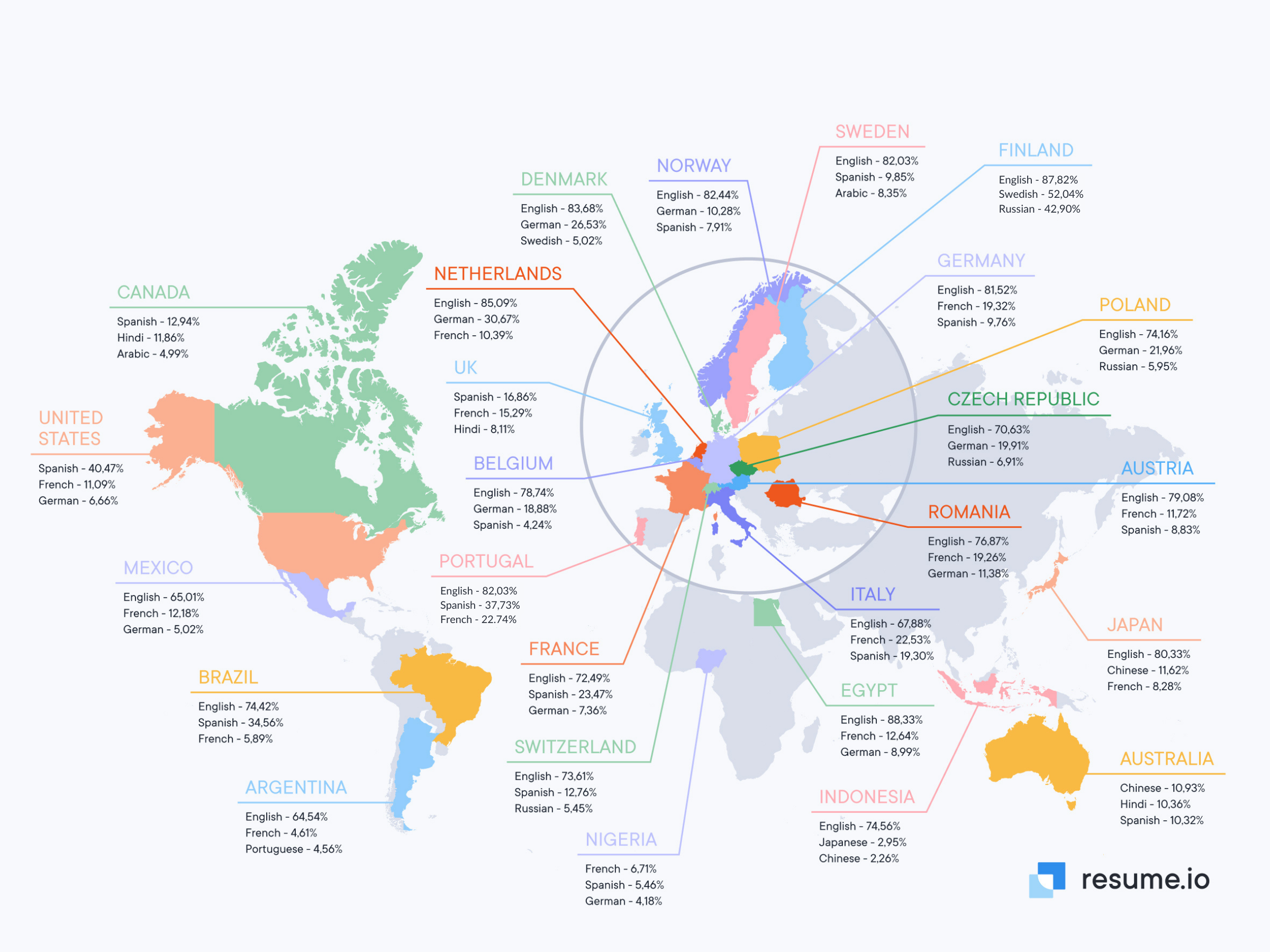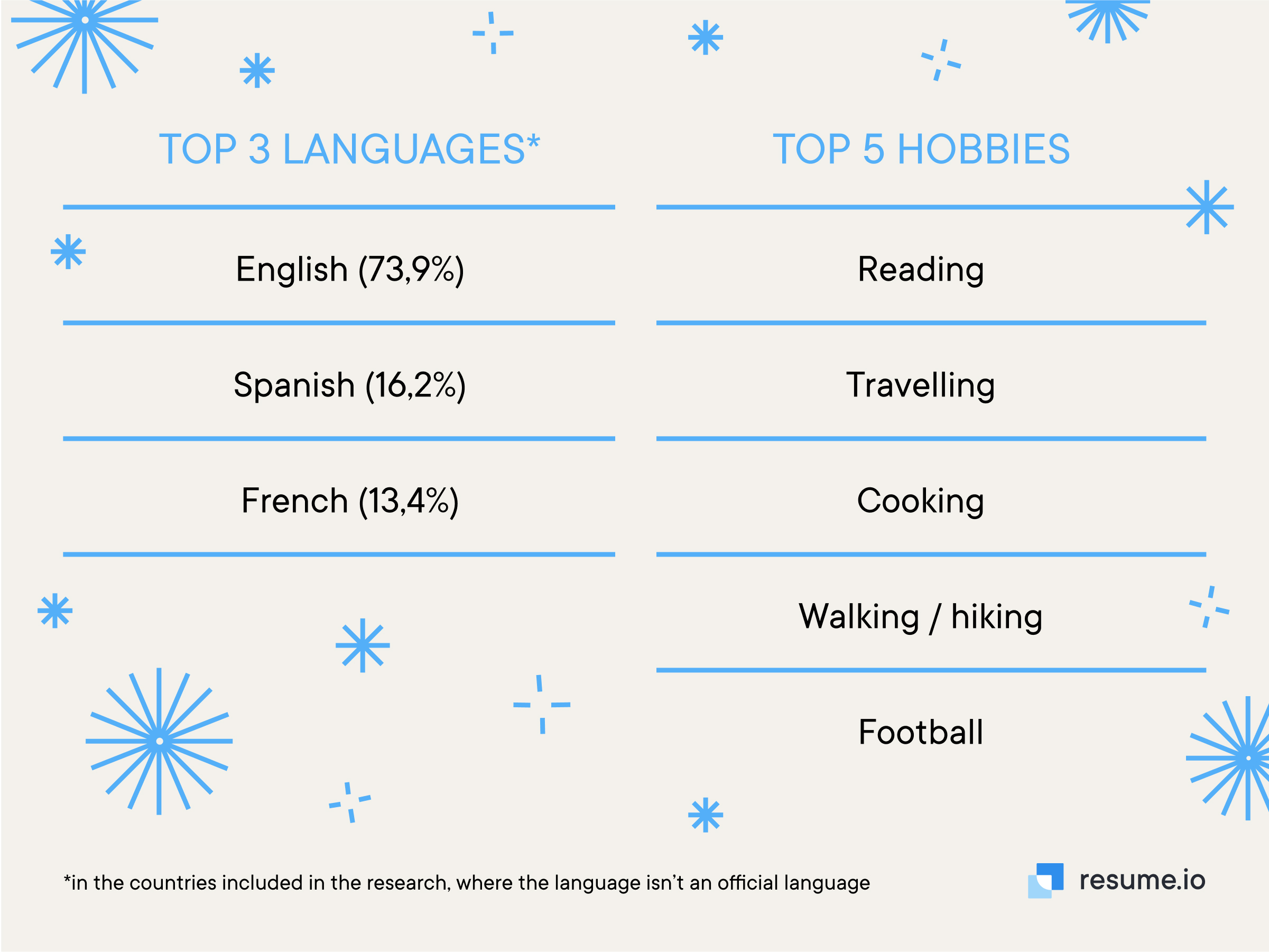Worldwide top languages
Since traveling is enjoyed by the majority of job applicants, it’s a good thing that many of them speak foreign languages. With proficiency in English (82%), Spanish (38%) and French (23%), the Portuguese speak the most different languages, while people from Canada and Nigeria speak the least non-native languages (as French is obviously native for some Canadians).
Egypt (88%), Finland (87%) and the Netherlands (85%) have the highest number of English-speaking inhabitants, and Spanish is ranked as the second-most spoken language, with the USA as the most Spanish speaking country (40%).
With such a mobile global workforce, the ability to speak a second or third language is a genuine superpower. So many people speak English that the paltry 16% of Brits that speak Spanish and 11% of Australians that speak Chinese is not surprising. The top four most spoken second languages from our survey of 30 countries are as follows:
English (23), Spanish (16), French (15), German (13)
The statistics that illustrate the most proficient countries for each language are fascinating:
- Most proficient countries for English: Egypt (88%), Finland (88%), Netherlands (85%), Denmark (84%), Norway (83%)
- Most proficient countries for Spanish: United States (40%), Portugal (38%), Brazil (35%), France (23%), Italy (19%)
- Most proficient countries for French: Portugal (23%), Italy (23%), Spain (19%), Germany (19%), Romania (19%)
- Most proficient countries for German: Netherlands (31%), Denmark (27%), Poland (22%), Czech Republic (20%), Belgium (18%)
The most spoken languages per country that are are not the official language in that country

Click here to see the image in full size
These figures are where people have chosen to include their languages prowess on their resume. This is standard practice across the world, so the numbers all add up.
Worldwide top hobbies
To give a resume a personal touch, many job applicants list their hobbies and interests on their resume. In a world where work/life blend matters more than ever, this allows potential employers to see the person beyond the work accomplishments.
Based on data from nearly 7 million resumes, reading is the most popular hobby across 30 countries, being mentioned in the top 5 in 90%. Traveling comes second at 77%, with cooking third most popular at 50%. Various individual sports then populate the list, so you could argue for sport in general as a strong contender for a top 2 placing.
- Reading is the top hobby in countries such as: Austria, Canada, France, India, Brazil, and the UK.
- Traveling is first in countries such as: Australia, Czech Republic, Indonesia, Japan, Switzerland, and the United States.
- Sports/exercise is most popular in countries such as: Belgium, Denmark, Finland, Netherlands, Norway, Sweden
Of course, different countries will have slightly different cultural norms in terms of including hobbies on a resume. You might be into singing (which 7% of Nigerians put on their resume), but it is understandable that you may not wish to include it. Karaoke night, anyone?
Sweden is the only country in Resume.io's analysis where both reading and traveling didn’t make it into the local top 5 hobbies. They are more into fitness, football, and music.
What takes second place after reading?
When you are spending so much time reading, you might think that a more active pursuit may come second. It is indeed the case that sporting activities or traveling feature in 2/3 of countries where reading is the top hobby. Not insignificantly, cooking and the arts come second in the remaining 1/3 of cases.
While reading is the top hobby in the UK (10%) and India (11%), in second place, the Brits are in the kitchen cooking away (5%), while cricket-mad Indians are outside playing the national sport (7%). Interestingly, South Africans mirror their UK mates in culinary pursuits coming second. France and Germany are equally hooked on books, while music comes a close second in France.
What is more popular – sport or traveling?
When you look at the top two choices worldwide, it is an exact 50/50 split between sport and traveling when you compare the two. With modern lives being so busy, these hobbies are not fully compatible. You can’t keep jetting off for weekend breaks when your team needs you.
When you think about the global tourist industry, it is unsurprising that the United States, Australia, and Japan put travel as their top pastime. In terms of a European country whose citizens value travel the most, it is a little surprising that Switzerland featured. If we were from there, we wouldn’t want to leave.
It is notable that many countries in Scandinavia put sport on the top spot. Winter sports are particularly popular in the region. Northern Europe isn’t far behind with the sport vibes with 9% of Dutch people putting fitness first and 6% of Belgians loving a hike.
How many countries enjoy cooking?
Cooking is also right up there in popularity, featuring in the top three hobbies for seven countries and in the top five for fifteen. It takes the number two spot in the UK - which is a surprise as their cuisine maybe does not have the best reputation.
Overview of worldwide top (3) languages and (5) hobbies

Click here to see the image in full size
About the analysis
The resume statistics in this article are based on an analysis of 6,895,120 resumes from people in 30 different countries, by Resume.io. This analysis was performed in the second quarter of 2023.





